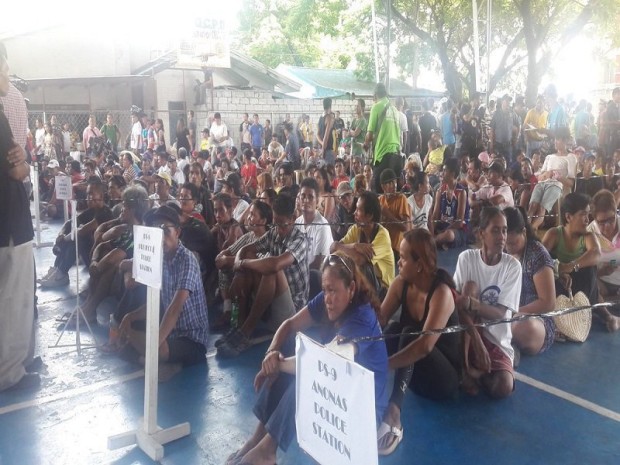Reformed drug users to become bet takers?

Drug users and pushers undergo briefing and orientation for rehabilitation. (RADYO INQUIRER FILE PHOTO)
For reformed drug users and pushers, light at the end of the tunnel could mean employment as lottery bet collectors.
That’s if President Duterte decides to let go of gambling among his pet peeves and targets for demolition.
The minority bloc in the House of Representatives is looking at Small Town Lottery (STL) to provide employment to the hundreds of thousands of people—largely impoverished Filipinos—who have heeded the call of Mr. Duterte to surrender or die in his campaign against illegal drugs.
“Thinking out of the box, we think it’s a good idea to use the street experience of these rehabilitated ‘surrenderers’ to work with Small Town Lottery collectors. The option of joining STL collectors gives these surrenderers a legal means of earning a living,” Rep. Danilo Suarez said at a press conference on Wednesday.
The Philippine Charity Sweepstakes Office (PCSO) runs the STL, one of the government’s approved gambling activities.
Article continues after this advertisementBiggest employer of gov’t
Article continues after this advertisementMr. Duterte said last month that he was weighing whether to abolish the agency because STL had been surreptitiously used for “jueteng,” the illegal numbers racket.
But Suarez described the PCSO as the “biggest employer of government,” and the STL as “clean, honest and transparent.”
“That is the beauty of STL. It’s not rigged,” Suarez said.
There’s also that choice between two evils.
Asked about the danger of former drug users becoming addicted to gambling, Suarez said that did not discount the possibility that any reformed addict could return to his wayward days.
Old habits
For 20 percent of these people, old habits die hard, Suarez said, citing statistics.
“It is a question of social orientation, getting help from the DSWD (Department of Social Welfare and Development), and to discourage them from mixing with their old peers. It’s a social action,” Suarez said.
Suarez said it was a “sad reality” that for the 734,231 drug users who had surrendered under the government’s “Oplan Tokhang” campaign and underwent rehabilitation, “finding gainful employment will be impossible because of lack of required education and relevant experience, and their association to illegal drugs.”
Suarez said the former drug addicts’ “value to society is diminished and disregarded.”
“Redemption is for everyone, and the minority is equal to the task of giving our surrenderers and their families a realizable future after rehabilitation,” he said.
Rehabilitation
Suarez said the PCSO had 200,000 collectors, covering only 32 percent of the country. He proposed that the gaming agency hire 150,000 rehabilitated addicts by the end of the year.
Buhay Rep. Lito Atienza said his experience as city mayor showed that former addicts returned to their ways in the absence of any “productive activity.”
“Instead of just teaching society violence and creating a culture of death without real action, we propose this,” he added.
“We kill and kill,” he said, referring to the Duterte administration’s deadly campaign against illegal drug users and pushers. “We don’t have a program for them,” Atienza said.
The campaign against the widespread use of “shabu,” or crystal meth, has claimed some 3,500 lives since Mr. Duterte took office on June 30, either in shootouts with arresting policemen or in extrajudicial killings by vigilantes, criminals and police “ninjas” recycling confiscated drugs.
The international community has condemned Mr. Duterte for human rights violations in his antinarcotics campaign, but recent surveys showed a large majority of Filipinos support him.